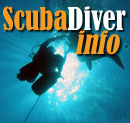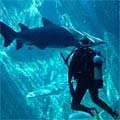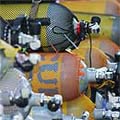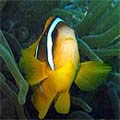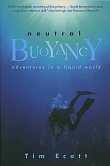 Understanding Neutral Buoyancy requires understanding the author. Tim Ecott is a reporter and producer for BBC World Service and has been writing for numerous prestigious international magazines and papers. He is a certified divemaster and a marine environmentalist. However, unlike the ultimate expert divers that have authored other diving books, Ecott is almost a reluctant diver. His father was a military man, and so young Ecott, a sickly, bronchitic child in his early childhood Wales fared much better in Malaya where his father was stationed for several years. A return to Ireland was a return to "varying shades of grey" for him. Though a lifelong swimmer, he came to scuba relatively late and his first experience was "just, well, fine." That daramtically changed later, but it's clear that this is a man who views diving as an emotional thing much more so than macho daring, socializing, or a scientific quest.
Understanding Neutral Buoyancy requires understanding the author. Tim Ecott is a reporter and producer for BBC World Service and has been writing for numerous prestigious international magazines and papers. He is a certified divemaster and a marine environmentalist. However, unlike the ultimate expert divers that have authored other diving books, Ecott is almost a reluctant diver. His father was a military man, and so young Ecott, a sickly, bronchitic child in his early childhood Wales fared much better in Malaya where his father was stationed for several years. A return to Ireland was a return to "varying shades of grey" for him. Though a lifelong swimmer, he came to scuba relatively late and his first experience was "just, well, fine." That daramtically changed later, but it's clear that this is a man who views diving as an emotional thing much more so than macho daring, socializing, or a scientific quest.
Tellingly, those who picked up Neutral Buoyancy with the anticipation of finding educational or instructional content regarding that important and celebrated aspect of diving will find it described in just one paragraph, an introduction to a chapter. The technical aspects are incidental; this book is really a collection of a wide variety of thoughts on diving, recorded by a deep and different soul, organized by an experienced journalist's mind, and crafted in exquisite language. Ecott, unlike many diving book autors, is a true writer, a professional, a master of language. Journalists and writers master the art of reporting facts and perhaps adapting them to the medium in which they will be published. In this instance, the medium is Ecott's own book where he is free to not just report, but also give his thoughts his personal spin.
Neutral Buoyancy is organized into a dozen chapters that each center on one general aspect of of things under the sea. There's, for example, a 30 page chapter entitled "Organic Gold" dedicated entirely to the sponge. Another deals with underwater habitats. There's "Flickering Images" that centers around Austrian diving pioneer Hans Hass and his wife Lotte, whom he seeks out and interviews. There's "Diving Free" that examines breathdiving record attempts and the whole experience around it. Or "In the Shadow of the Fire God" that describes a trip Ecott took to the Bismarck Sea. "Advanced French" deals with the various findings and advances a number of French pioneers brought to diving, most importantly, though not necessarily in Ecott's eyes, Jacques Cousteau (who he largely sees as a publicity grabbing egotist). There are other chapters dealing with underwater dangers, diving history, underwater warfare, pioneers, all presented in beautifully crafted language.
Ecott is a true citizen of the world. His world only, for sure, but of the world nonetheless. He travels to the places he seeks, delves deeply into them. His research is not just academic, no, he seeks out and interviews the pioneers, visits the places where things took place, and weaves it all into his words and descriptions.
Despite all this, I found the book an acquired taste. During the first half, I was often put off by what I found an overly negative view of things, one dismissive of essentially anything that wasn't old and untouched or at least made in the olden ways. I tired of the endless references on man's cruelty and thoughtless carelessness, and the somewhat manipulative hangdog way those thoughts were presented. That led me to becoming an overly critical reader who approached each new chapter with some bias, to the extent where I began faulting the writer for putting clearly British words like "programme" into an American's mouth. I actually put the book down for several weeks.
Then I picked it up again and I am glad I did. Having accepted Ecott's deeply personal view of the world and his tendency to craft personal biases into his accounts, I was finally able to appreciate the true magic of this book, the wealth of information and experiences it conveys without ever once falling prey to that old authors' vice, that of talking down or showing off, at least not in a technical sense. Neutral Buoyancy can be read and enjoyed by people who do not know diving, have never dived. His skillfully crafted brief explanations of diving basics explain without putting off experts while his gift of describing details, of truly painting with words, of conjuring up pictures and thoughts in a masterful way, will thrill even the most advanced diver.
.
-- C. H. Blickenstorfer
